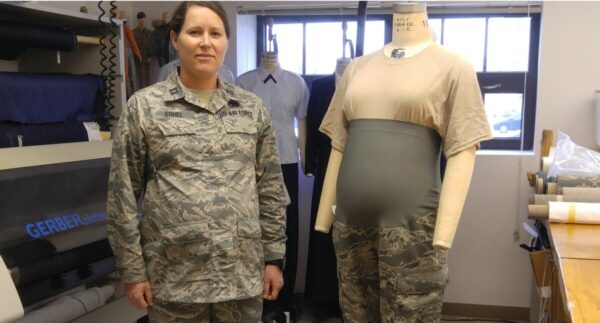
- Details
- By Native News Online Staff
WASHINGTON — After hearing from military women around the country who were struggling with the cost and availability of military maternity uniforms, Rep. Deb Haaland (D-NM-01) introduced a bill to help alleviate the problem.
Haaland, one of the first American Indian women to serve in Congress, introduced the “Rent the Camo: Access to Maternity Wear Act” as part of the National Defense Authorization Act (NDAA) that passed the House of Representatives in late June with bipartisan support.
Under the “Rent the Camo” pilot program, pregnant military service members will be able to access maternity uniforms and related items at no cost. The uniforms are free of toxic chemicals that may harm the baby or mother.
“Women deserve to have long successful careers in the military, but right now the cost of paying for maternity clothes is another unfair barrier women have to overcome to pursue their careers,” Haaland said.
A recent report from the U.S. Government and Accountability Office found that pregnancy and childcare are some of the top reasons women say they left the service.
“When I was growing up, my mother was forced out of the Navy because she was pregnant, and though times have changed mothers are still being forced out of the military through more covert barriers,” Haaland said.
“We came up with a creative solution that will ensure women in the military don’t have extra burdens to bear when bringing children into the world, ultimately leading to more equity in the military, all while ensuring military uniforms are made to keep moms and babies safe from harmful chemicals,” Haaland continued.
Rent the Camo: Access to Maternity Wear Act that was included in the NDAA specifically:
- Directs the Director of the Defense Logistics Agency (DLA), in coordination with the Secretaries concerned, to carry out a pilot program under which each Secretary concerned will establish an office for issuing maternity-related uniform items to pregnant members of the Armed Forces on a temporary basis and at no cost to the member.
- Ensures there is a healthy stock-level of maternity-related uniform items, including service uniforms, utility uniforms, and other items relating to command and duty assignment.
- Demands that maternity uniforms are not treated with the chemical permethrin.
- Gives Secretaries and Directors the flexibility to execute the pilot program based on their unique individual Service needs to include timelines, number of items being issued, and development of further guidance, etc.
- Requires inspection, processing, repairing, cleaning and re-stocking returned items before re-issuance.
- Requires the Director of DLA, in coordination with the Secretaries, to submit a report to the Congressional defense committees including an overview of the costs associated with, and any savings realized by, the pilot program including a comparison of the cost of maintaining a stock of maternity-related uniform item for issuance, recommendations on continuance of the program, whether legislation is needed to extend the program, and any other matters the Secretary of Defense deems appropriate by Sept 30, 2025.
- Provides $10,000,000 to implement the pilot program.
More Stories Like This
Native News Weekly (August 25, 2024): D.C. BriefsUS Presidents in Their Own Words Concerning American Indians
Breaking: Ben Nighthorse Campbell, Cheyenne Leader and Former U.S. Senator, Walks On
Zuni Youth Enrichment Project Joins 10th National Farm to Cafeteria Conference, Strengthens Partnerships for 2026 Food Sovereignty Work
Top Five Most-Read Stories in 2025 on Native News Online
Help us defend tribal sovereignty.
At Native News Online, our mission is rooted in telling the stories that strengthen sovereignty and uplift Indigenous voices — not just at year’s end, but every single day.
Because of your generosity last year, we were able to keep our reporters on the ground in tribal communities, at national gatherings and in the halls of Congress — covering the issues that matter most to Indian Country: sovereignty, culture, education, health and economic opportunity.
That support sustained us through a tough year in 2025. Now, as we look to the year ahead, we need your help right now to ensure warrior journalism remains strong — reporting that defends tribal sovereignty, amplifies Native truth, and holds power accountable.
 The stakes couldn't be higher. Your support keeps Native voices heard, Native stories told and Native sovereignty defended.
The stakes couldn't be higher. Your support keeps Native voices heard, Native stories told and Native sovereignty defended.
Stand with Warrior Journalism today.
Levi Rickert (Potawatomi), Editor & Publisher

